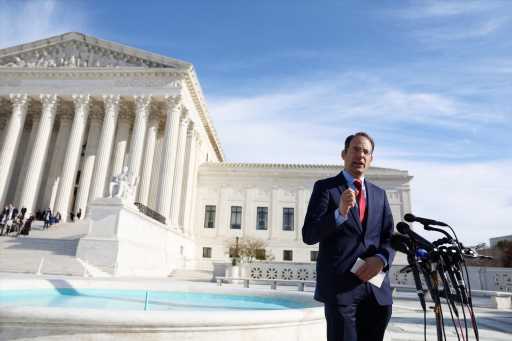U.S. Supreme Court rejects Counterman v. Colorado standard for threats
The U.S. Supreme Court on Tuesday strengthened First Amendment protections for threatening statements and found that Colorado prosecutors and judges violated a man’s Constitutional rights in a recent stalking case.
The court’s ruling in Counterman v. Colorado will make it more difficult for prosecutors to prove criminal charges against people who make threats, Colorado Attorney General Phil Weiser said in a statement.
The justices ruled that prosecutors in a criminal threats case must prove not only that a person made threatening statements, but also that the person knew the statements were threatening. Colorado’s legal framework previously required prosecutors to prove only the impact the statements would have on a reasonable person, not the speaker’s intent.
“The State must prove in true-threats cases that the defendant had some subjective understanding of his statements’ threatening nature,” Justice Elena Kagan wrote for the majority.
In the 7-2 decision, the justices rejected Colorado’s objective standard in favor of a subjective standard that considers the speaker’s state of mind. They cited concerns that the objective standard would chill free speech and encourage people to “self-censor,” afraid of how their words would be perceived.
The high court also established to what degree speakers must know their statements are threatening, finding that prosecutors must show only that the speakers acted recklessly.
“The State must show that the defendant consciously disregarded a substantial risk that his communications would be viewed as threatening violence,” Kagan wrote. “…For true threats, recklessness strikes the right balance, offering ‘enough “breathing space” for protected speech,’ without sacrificing too many of the benefits of enforcing laws against true threats.”
Justices Amy Coney Barrett and Clarence Thomas dissented, arguing that the majority’s ruling gives too much protection to threatening statements.
The ruling goes against the recommendation of the Department of Justice, which, under President Joe Biden, had argued that Colorado’s objective standard was appropriate, particularly given how the internet and social media have expanded the quantity and types of threats. They warned the case could affect the ability to prosecute threats against public officials, which have increased in recent years.
Weiser, who argued before the Supreme Court in support of Colorado’s objective standard, said in a statement Tuesday that the ruling fails victims of stalking and harassment and creates a “loophole” for stalkers to claim they did not know their words would be perceived as threatening.
“Stalkers cause major harm by their words alone, whether they mean to cause that harm or not,” he said. “But the Court has chosen to prioritize threats over those terrorized by the threats.”
The decision doesn’t overturn Colorado’s stalking law, but does raise the standard for prosecutors who bring cases under the statute, said Christopher Jackson, an appellate lawyer at Holland and Hart.
“The right way to think about it is, there is still a criminal law that prevents this kind of conduct, but now going forward, any prosecution will have to prove recklessness,” he said. “It imposes another element on the crime.”
He added that the ruling likely will affect only a narrow subset of criminal cases in which a defendant’s mental state is at the center of the dispute.
“Practically speaking, it’s unclear how often this kind of case will occur, because what you have to have is a situation where the defendant knows what they said, but there is some question about whether they knew their words could reasonably be taken as a threat,” he said.
The ruling came out of a Colorado case in which a man convicted of stalking, Billy Counterman, challenged his conviction on the grounds his unsolicited and unwelcome social media messages were protected free speech. His attorneys argued that he was mentally ill and did not mean for the messages to be threatening.
The justices agreed, overturning a Colorado Court of Appeals decision and sending Counterman’s case back to the state’s courts for reconsideration.
Counterman sent a Colorado musician as many as 1,000 messages during a two-year span that began in 2014. She ignored his messages and repeatedly blocked him, but he continued to send messages that implied he was watching the woman, was romantically interested in her and was frustrated by her lack of response.
“You’re not being good for human relations,” Counterman wrote in one message. “Die. Don’t need you.”
Colorado courts found that Counterman’s messages were threats. He was convicted of stalking and sentenced to 4½ years in prison. His appeal then made its way to the U.S. Supreme Court.
Counterman’s attorney, John Elwood, previously argued that ignoring a speaker’s intent chilled free speech and set a dangerous precedent in which speakers could be prosecuted for misunderstandings or statements that are wrongly perceived by the receiver.
In a statement Tuesday, Elwood said he is “gratified that the Supreme Court agreed with Billy Counterman that the First Amendment requires proof of mental state before it can imprison a person for statements that are perceived as threatening.”
The Associated Press contributed to this report.
Sign up to get crime news sent straight to your inbox each day.
Source: Read Full Article

